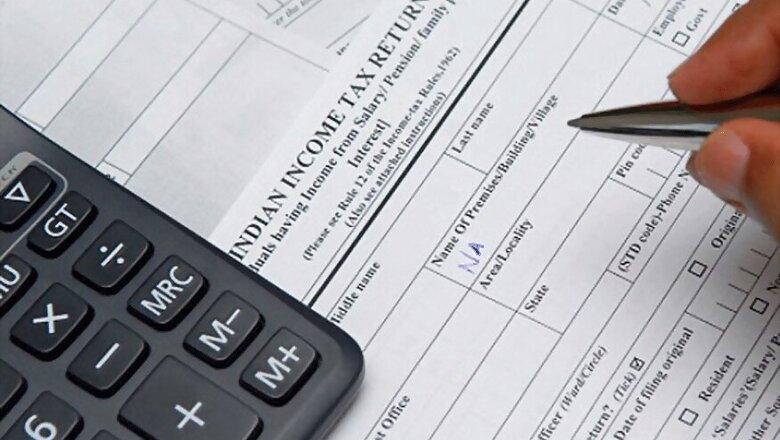
views
Everyone can save Income tax legally by appropriately utilising the Income tax deductions offered by the Income tax department of India.
It is prudent to make investments under different investment instruments that not only give you peace of mind for the future but also help you to lessen your income tax burden.
Similarly there are certain medical expenditures that can be claimed for deduction from your taxable income. Let’s understand these Income Tax Deductions one by one:
1. Income Tax Deduction Under Section 80C
Under Section 80C you can invest upto ₹1,50,000/- from your annual income and claim deduction for the same from your taxable income. There are various investment instruments specified under Section 80C viz: Public Provident Fund (PPF), Contribution to Employee Provident Fund (EPF), Mutual Funds, Equity Oriented Mutual Funds, Fixed Deposits (FD), National Savings Certificate (NSC), Repayment of Principal Amount on Home Loan, Life Insurance Policy.
2. Income Tax Deduction Under Section 80CCC and 80CCD
Section 80CCC deals with investment in annuity/pension plans of Insurance companies. The investment made under these pension plans comes under the combined limit of ₹1,50,000/- with deductions under Section 80C.
Section 80CCD relates to contribution made to National Pension Scheme (NPS) of Central Government. An amount upto ₹50,000/- is deducted from taxable income over and above the ₹1,50,000/- limit.
3. Income Tax Deduction Under Section 80TTA
Section 80TTA allows for a deduction of upto ₹10,000/- for interest earned on savings account. You need to specify the interest earned from savings account under Income from other Sources and then claim a deduction upto ₹10,000/- under this section.
4. Income Tax Deduction Under Section 24
Section 24 of Income Tax Act deals with deduction on Interest Accrued/Levied on Home Loan. So investing in a home by taking home loan is prudent as you can claim deduction for the interest levied on it. If the home is self-occupied then you can claim upto ₹2,00,000/- from deduction, however if the home on which the home-loan is taken, is not self-occupied then you can claim for all the interest accrued on it minus any rent received.
5. Income Tax Deduction Under Section 80D
Section 80D deals with Mediclaim or Health Insurance bought for self, spouse or dependent children/parents. An amount of ₹25,000/- can be claimed for preventive health check-ups and health insurance bought for self, spouse and dependent children whereas in case of preventive health check-ups and health insurance purchased for senior citizens, you can claim ₹30,000/-. This deduction is over and above the ₹1,50,000/- limit of Section 80C.
6. Income Tax Deduction Under Section 80DD, 80U and 80DDB
Section 80DD deals with deduction for upto ₹1,25,000/- for medical expenditure incurred on a disable spouse/children/siblings/parents including medical insurance.
Section 80U deals with deduction for upto ₹1,25,000/- for a person certified with 40% or 80% disability for medical expenditure incurred on self including medical insurance.
Section 80DDB deals with deduction upto ₹80,000 for dependent above 80 years, ₹60,000 for senior citizen and ₹40,000 for self/spouse/children/parents for medical expenditure incurred on treating the below mentioned specified diseases:
- Chronic Renal Failure
- Malignant Cancers
- Hematological Disorders
- Neurological Diseases
- AIDS
7. Income Tax Deduction Under Section 80E
Section 80E deals with payment of Interest on Education loan taken for self/spouse/dependent children. There is no cap on the amount that can be claimed for deduction from your taxable income under Section 80E.
8. Income Tax Deduction Under Section 80G
Section 80G points to Donations made to specified government organizations as well as some specified NGOs. Although for most of the list there is no limit to which you can donate and claim deduction under 80G, there are certain organizations like political parties to which you cannot make a donation more than 10% of your Gross Total Income.
9. Income Tax Deduction Under Section 80GG
Section 80GG deals with deduction upto ₹60,000/- for rent paid by an individual. This deduction is for those individuals who do not get the benefit of HRA exemption or haven’t claimed the deduction for rent paid under other another section.
10. Income Tax Deduction Under Section 80CCG
Section 80CCG deals with investments made in Equity Savings Scheme and you can claim a deduction under Section 80CCG for upto ₹25,000/-. This deduction can be claimed by first-time investors who are investing in listed shares or mutual funds with a lock-in period of 3 years.
















Comments
0 comment